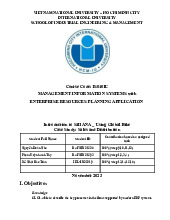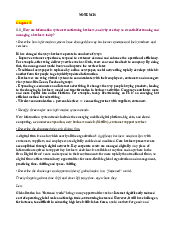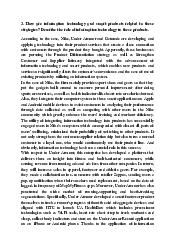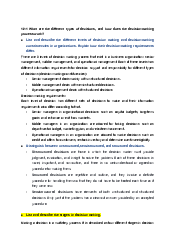




Preview text:
Chapter 4:
4-2 What specific principles of conduct can be used to guide ethical decisions?
● List and describe the five steps in ethical analysis.
The five steps in the ethical analysis include: o
Identify and describe the facts clearly: Find out who did what to whom, and
where, when, and how. There usually are a surprising number of errors in the
initially reported facts. Most of the time, we will find that simply getting the facts
straight helps define the solution. It also helps to get an agreement on the facts
of opposing parties involved in an ethical dilemma. o
Define the conflict or dilemma and identify the higher-order values involved:
Ethical, social, and political issues always reference higher values. The parties to
a dispute all claim to be pursuing higher values (e.g., freedom, privacy,
protection of property, and the free enterprise system). Typically, an ethical issue
involves a dilemma: two diametrically opposed courses of action that support
worthwhile values. For example, the chapter-ending case study illustrates two
competing values: the need to protect citizens from terrorist acts and the need to protect individual privacy. o
Identify the stakeholders: Every ethical, social, and political issue has
stakeholders: players in the game who have an interest in the outcome, who
have invested in the situation, and usually who have vocal opinions (Smith,
2003). Find out the identity of these groups and what they want. This will be
useful later when designing a solution. o
Identify the options that you can reasonably take: You may find that none of the
options satisfy all the interests involved, but that some options do a better job
than others. Sometimes arriving at a good or ethical solution may not always be
a balancing of consequences to stakeholders. o
Identify the potential consequences of your options: Some options may be
ethically correct but disastrous from other points of view. Other options may
work in one instance but not in other similar instances. Always ask yourself,
“What if I choose this option consistently over time?”
● Identify and describe six ethical principles
Six ethical principles are available to judge conduct. These principles are derived
independently from several cultural, religious, and intellectual traditions and include: o
Golden Rule—Do unto others as you would have them do unto you. o
Immanuel Kant’s Categorical Imperative—If an action is not right for everyone to
take, it is not right for anyone. o
Descartes’ rule of change—If an action cannot be taken repeatedly, it is not right to take at all. o
Utilitarian Principle—Take the action that achieves the higher or greater value. o
Risk Aversion Principle—Take the action that produces the least harm or the least potential cost. o
“No free lunch” rule—Assume that virtually all tangible and intangible objects are
owned by someone else unless there is a specific declaration otherwise.
These principles should be used in conjunction with an ethical analysis to guide
decision-making. Ethical analysis involves identifying the facts, values, stakeholders,
options, and consequences of actions. Once completed, you can consider which ethical
principle to apply to a situation to arrive at a judgment.
Case study: Facebook Privacy: Your Life for Sale p157
4-13 Perform an ethical analysis of Facebook. What is the ethical dilemma presented by this case?
The stakeholders involved in an ethical analysis of Facebook include Facebook
(obviously), advertisers, device makers, data collecting agencies, Electronic Privacy
Information Center (EPIC), governments, and individual users.
Facebook collects an incredible amount of personal data on its users. It is using its
ability to track the online activity of its members to develop a frighteningly accurate
picture of their lives. It gathers personal information about users, both with and without
their consent, which can be used against them in other ways. It also collects data of
friends of users without their knowledge or consent. All the data on users and users’
friends are available for sale.
Facebook’s goal is to get its users to share as much data as possible because the more
Facebook knows, the more accurately it can serve relevant advertisements and thus,
charge higher fees to advertisers.
Facebook’s critics are concerned that the repository of personal data of the size that
Facebook has amassed requires protections and privacy controls that extend far
beyond those that Facebook currently offers.
4-14 What is the relationship of privacy to Facebook’s business model?
The less privacy Facebook offers to its users, the more valuable and useful its business
model becomes. By providing more privacy to its users, the less data it collects, stores,
and provides to advertisers. That makes its business model less valuable because
advertisements cannot be as fully developed for individual users.
Facebook CEO Mark Zuckerberg says that people want the world to be more open and
connected. He also wants the world to be more open and connected because his
company stands to make more money in that world.
While Facebook has shut down several of its more egregious privacy-invading features
and enhanced its consent process, the company’s data use policies make it very clear
that, as a condition of using the service, users grant the company wide latitude in using
their personal information in advertising. The default option for users is “opt-in”; most
users do not know how to control the use of their information, and they cannot “opt-
out” of all sharing if they want to use Facebook. This is called the “control paradox” by
researchers: even when users are given control over the use of their personal
information, they typically choose not to use those controls. Although users can limit
some uses of their information, an advanced degree in Facebook data features is required.
Facebook also had data-sharing partnerships with at least 60 device makers all of whom
could capitalize on the data and make more money for their companies. Data sharing
restrictions placed on software developers from collecting information about
customers’ friends did not extend to device makers.
4-15 Describe the weaknesses of Facebook’s privacy policies and features. What
have management, organization, and technology factors contributed to those weaknesses?
Management: Ninety-three percent of people polled believe that Internet companies
should be forced to ask for permission before using their personal information much as
European countries require. Seventy-two percent want the ability to opt-out of online
tracking. Executives and managers must develop policies and procedures that address
those concerns at the same time they are developing a competitive strategy to
effectively use personal information to increase the company’s value to advertisers.
Privacy advocate groups like the Electronic Privacy Information Center want Facebook to
restore its more robust privacy settings from 2009. If it does that, some of its value to advertisers will diminish.
Organization: Facebook’s value and growth potential are determined by how effectively
it can leverage the personal data that is aggregated about its users to attract
advertisers. It also stands to gain from managing and avoiding the privacy concerns
raised by its users and government regulators.
Technology: Facebook does not have a good history when it comes to privacy violations
and missteps that raise doubts about whether it should be responsible for the personal
data of hundreds of millions of people. It has settled lawsuits with the Federal Trade
Commission in which they were barred from misrepresenting the privacy or security of
its users’ personal information. It was charged with deceiving its users by telling them
they could keep their information on Facebook private, then repeatedly allowing it to be
shared and made public. It has also come under fire for collecting information about
users who are not even logged into Facebook or do not have accounts with the
company. It keeps track of activity on other sites that have “Like” buttons or
“recommendations” widgets and records the time of your visit and your IP address
when you visit a site with those features, regardless of whether or not you click on them.
4-16 Will Facebook be able to have a successful business model without invading
privacy? Explain your answer. Are there any measures Facebook could take to make this possible?
Opinions will vary on this question. Certainly, Facebook’s ability to leverage as much as
possible from advertisers may be diminished if it cannot collect every nugget of
information about its users to sell to advertisers. However, it could make up some of
the lost revenue by charging users a premium fee for the company to not collect as
much information and restore a higher level of privacy to those who are willing to pay for it.
For the first time since its founding, Facebook is facing a serious existential crisis, and
potentially a threat to its business model. Facebook’s current crisis follows from a
history of privacy abuses in its short 14-year life. However, there are some signs that
Facebook might become more responsible with its data collection processes, whether
by its own volition or because it is forced to do so. As a publicly traded company,
Facebook now invites more scrutiny from investors and regulators.
The company can also allow users to view all the data it collects on them and allow
them to delete information they deem necessary. They can also allow users to opt-out
of the tracking systems much like European users already can.
Facebook should continue to explore additional revenue streams outside of what it already has in advertising.
Critics have asked Facebook why it doesn’t offer an ad-free service—like music
streaming sites—for a monthly fee. Others want to know why Facebook does not allow
users just to opt out of tracking. But these kinds of changes would be very difficult for
Facebook because its business model depends entirely on the largely unfettered use of
its users’ personal private information, just as it declares in its data use policy. That
policy states very openly that if you use Facebook you agree to its terms of service,
which enable it to share your information with third parties.




